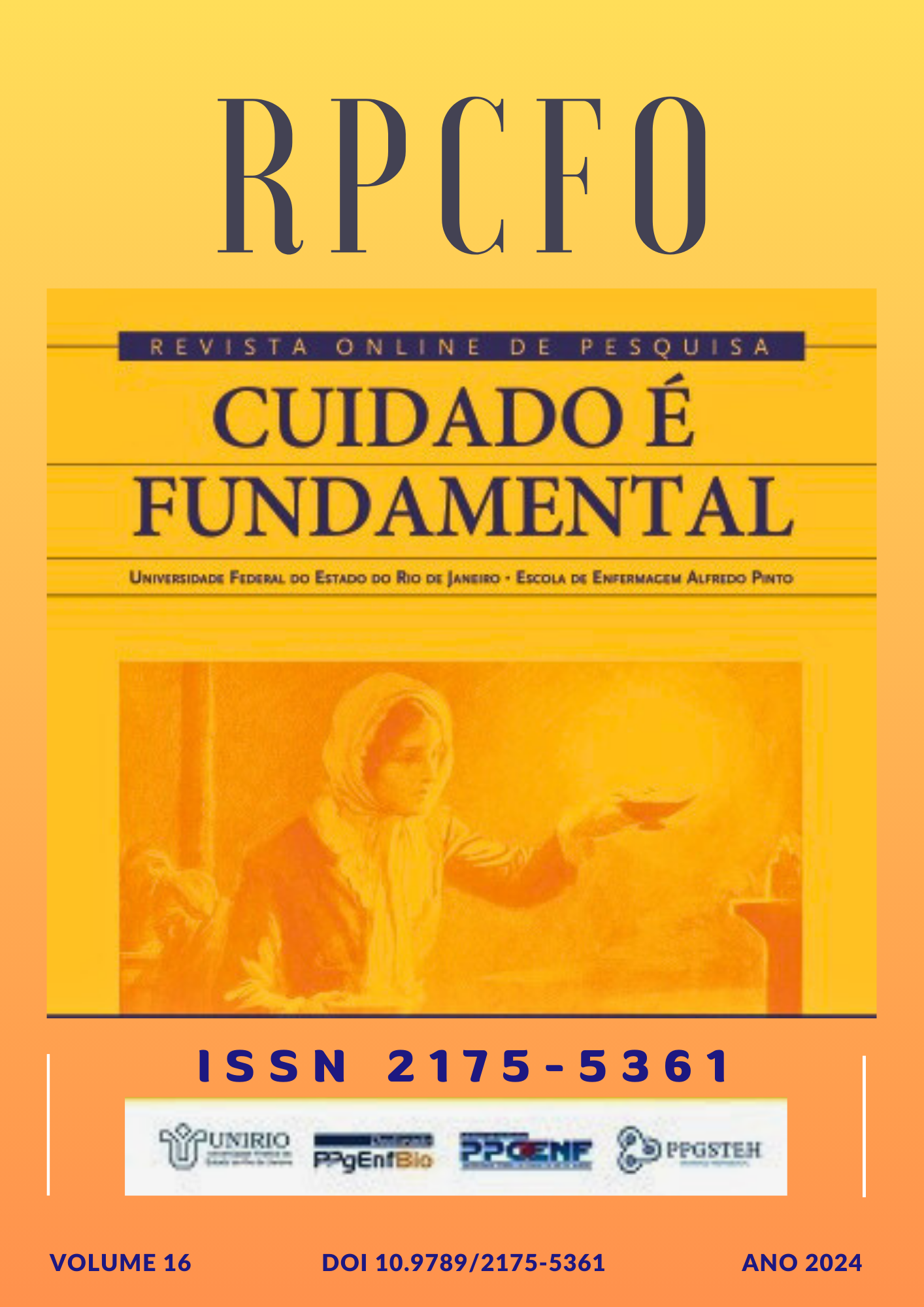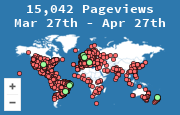Congenital Zika vírus syndrome: “we are just tools, the ral therapist is the family” / Síndrome congênita do Zika vírus: somos só ferramentas, o verdadeiro terapeuta é a família
DOI:
https://doi.org/10.9789/2175-5361.rpcfo.v16.12970Keywords:
Cuidado da criança;, Desenvolvimento infantil, Educação em saúde, Microcefalia, Zika vírusAbstract
Objective: to find out how health professionals perceive the continuity of care for children with Congenital Zika Virus Syndrome in the home context. Method: a study with a qualitative approach was carried out based on the theoretical framework of Patient- and Family-Centered Care. Results: participants were 12 health professionals working in a specialized service in a capital in the Brazilian Midwest. It was found that the continuity of care for children with the syndrome in the home context is influenced by the insecurity of the unknown, fear of prejudice and family organization after the child's birth. Conclusion: health professionals seek to favor continuity of care, encouraging social interaction and children's independence and guiding families about their rights.
Downloads
References
Guimarães CP, Macedo MS, Barbosa MA, Marques SM, Costa PS, Oliveira EC. Clinical findings in congenital infection by Zika virus: a retrospective study in a reference hospital in Central-West Brazil. BMC pediatrics. [Internet] 2019 [cited 2022 Nov. 15]; 19(1):1-5. Available from: https://doi.org/10.1186/s12887-019-1762-6.
Venancio FA, Bernal MEQ, Ramos MCBV, Chaves NR, Hendges MV, Souza MMR, et al. Congenital Zika Syndrome in a Brazil-Paraguay-Bolivia border region: Clinical features of cases diagnosed between 2015 and 2018. PloS One. [Internet] 2019 [cited 2022 Sep. 15]; 14(10). Available from: https://doi.org/10.1371/journal.pone.0223408.
Bailey DB, Ventura LO. The Likely Impact of Congenital Zika Syndrome on Families: Considerations for Family Supports and Services. Pediatrics. [Internet] 2018 [cited 2022 Nov 11]; 141(Suppl. 2):180-7. Available from: https://doi.org/10.1542/peds.2017-2038G.
Dias BC, Ichisato SMT, Marchetti MA, Neves ET, Higarashi IE, Marcon SS. Challenges of family caregivers of children with special needs of multiple, complex and continuing care at home. Esc Anna Nery. [Internet] 2019 [cited 2022 Dec. 10]; 23(1): e20180127. Available from: https://doi.org/10.1590/2177-9465-EAN-2018-0127.
Pinto CDBS, Marangoni DAS, Ferrari FP, Ajalla MEA, Venancio FA, Rosa TS, et al. Health demands and care of children with congenital Zika syndrome and their mothers in a Brazilian state. BMC Public Health. [Internet] 2020 [cited 2022 Nov. 18]; 20:1-10. Available from: https://doi.org/10.1186/s12889-020-08880-6.
Duarte JS, Santos LOF, Sette GCS, Santos TFC, Alves FAP, Marinus MWLC. Necessidades de crianças com síndrome congênita pelo Zika vírus no contexto domiciliar. Cad. Saude Colet. [Internet] 2019 [cited 2022 Oct. 21]; 27:249-256. Available from: https://doi.org/10.1590/1414-462X201900030237.
Institute For Patient And Family Centered Care (IPFCC). Advancing the practice of patient- and family-centered care in primary care and other ambulatory settings: how to get started. [Internet] 2016. [cited 2023 Feb. 25]. Available from: https://thepcc.org/resource/advancing-practice-patient-and-family-centered-care-primary-care-and-other-ambulatory.
Bulhões CSG, Silva JB, Moraes MN, Reichert APS Dias MD, Almeida AM. Psychic repercussions in mothers of children with congenital Zika virus syndrome. Esc Anna Nery. [Internet] 2020 [cited 2022 Sep. 17]; 24(2). Available from: https://doi.org/10.1590/2177-9465-EAN-2019-0230.
Minayo MCS. Amostragem e saturação em pesquisa qualitativa: consensos e controvérsias. Rev Pesqui Qual. [Internet] 2017 [cited 2023 Jan. 10]; 5(7): 01-12. Available from: https://editora.sepq.org.br/rpq/article/view/82.
Bardin L. Análise de conteúdo. 2016; Lisboa, 70 ed.
Costa PRLA, Aragão FBA, Serra JN, Andrade MS, Reis AD, Nascimento MDSB. Quality of life of mothers of children with congenital syndrome affected by zika virus. Rev. Paul. Pediatra. [Internet] 2020 [cited 2022 Sep. 08]; 39. Available from: https:/doi.org/10.1590/1984-0462/2021/39/2019231.
Mendes AG, Campos DS, Silva LB, Moreira MEL, Arruda LO. Facing a new reality from the Zika Virus Congenital Syndrome: the families’ perspective. Ciênc. Saúde Colet. [Internet] 2020 [cited 2022 Oct. 20]; 25(10):3785-3794. Available from: https://doi.org/10.1590/1413-812320202510.00962019.
Pedrosa RKB, Guedes ATA, Soares AR, Vaz EMC, Collet N, Reichert APS. Itinerary of children with microcephaly in the health care network. Esc. Anna Nery. [Internet] 2020 [cited 2022 Oct. 15]; 24(3):e20190263. Available from: https://doi.org/10.1590/2177-9465-EAN-2019-0263.
Junqueira CCS, Leôncio ABA, Vaz EMC, Santos NCCB, Collet N, Reichert APS. Stimulation of children with congenital Zika syndrome at home: challenges for the caregivers. Rev Gaucha Enferm. [Internet] 2020 [cited Feb. 18]; 41. Available from: https://doi.org/10.1590/1983-1447.2020.20190247.
Hamad GBNZ, Souza KVD. Special child, special mother: the sense of strength in mothers of children with congenital zika vírus syndrome. Esc Anna Nery. [Internet] 2019 [cited 2022 Oct. 10]; 23(4):e20190022. Available from: https://doi.org/10.1590/2177-9465-EAN-2019-0022.
Souza AI, Siqueira MT, Ferreira ALCG, Freitas CU, Bezerra ACV, Ribeiro AG, et al. Geography of microcephaly in the zika era: a study of newborn distribution and socio-environmental indicators in Recife, Brazil, 2015-2016. Public Health Reports. [Internet] 2018 [cited 2022 Oct. 12]; 133(4):461-471. Available from: https://journals.sagepub.com/doi/10.1177/0033354918777256.
Lima LHSS, Monteiro EMLM, Coriolano MWL, Linhares FMP, Cavalcanti AMTS. Family fortresses in Zika Congenital Syndrome according to Betty Neuman. Rev. Bras. Enferm. [Internet] 2020 [cited 2022 June 20]; 73(2):e20180578. Available from: https://doi.org/10.1590/0034-7167-2018-0578.
Smith BM, Sharma R, Das A, Aboumatar H, Pitts S, Day J, et al. Patient and family engagement strategies for children and adolescents with chronic diseases: a review of systematic reviews. Patient Educ Couns. [Internet] 2021 [cited 2022 June 11]; 104(9):2213-23. Available from: https://doi.org/10.1016/j.pec.2021.02.026.
Albuquerque MFPM, Souza WV, Araújo TVB, Braga MC, Miranda Filho DB, Ximenes RAA, et al. The microcephaly epidemic and Zika vírus: Building knowledge in epidemiology. Cad. Saúde Pública. 2018; 34(P):e00069018.
Lowe R, Barcellos C, Brasil P, Cruz OG, Honório NA, Kuper H, et al. The Zika virus epidemic in Brazil: from discovery to future implications. Int J Environ Res Public Health. 2018; 15:e96.
Souza WV, Albuquerque MFPM, Vazquez E, Bezerra LCA, Mendes ACG, Lyra TM, et al. Microcephaly epidemic related to the Zika vi - rus and living conditions in Recife, Northeast Brazil. BMC Public Health. [Internet] 2018 [cited 2022 June 28]; 18:130. Available from: https://doi.org/10.1186/s12889-018-5039-z.
Barbosa AP, Martins MM, Guastavino AB, Cunha AJ. Effects of Zika infection on growth. J Pediatr (Rio J). [Internet] 2019 [cited 2022 Nov. 20];95:S30-S41. Available from: https://doi.org/10.1016/j.jped.2018.10.016.
Subissi L, Dub T, Besnard M, Helle TM, Nhan T, Magnin DL, et al. Zika Virus Infection during Pregnancy and Effects on Early Childhood Development, French Polynesia, 2013–2016. Emerg Infect Dis. [Internet] 2018 [cited 2022 Nov. 14];24(10):1850-1858. Available from: https://doi.org/10.3201/eid2410.172079.
Silva YRO, Arrais BB, Santos MA, Barata MFO, Falcão IV. The frevo step improving the rehabilitation of children with Congenital Zika Virus Syndrome. Cad. Bras. Ter. Ocup. [Internet] 2019 [cited 2022 Dec. 02]; 27(2):448-453. Available from: https://www.scielo.br/j/cadbto/a/YLrgTxmMwWCDKSn85NtTXth/?format=pdf&lang=en.
Oliveira BSB, Melo FMS, Oliveira RKL, Figueiredo Neta JF, Monteiro FPM, Joventino ES. Early stimulation in the development of children with microcephaly: maternal perception. Rev Bras de Enferm. [Internet] 2019 [cited 2022 Dec. 12]; 72(suppl 3):139-146. Available from: https:/doi.org/10.1590/0034-7167-2018-0272.
Marcon SS, Dias BC, Neves ET, Marcheti MA, Lima RAG. (In)visibility of children with special health needs and their families in primary care. Rev Bras Enferm. [Internet] 2020 [cited 2022 Sep. 11]; 73:e20190071. Available from: https://doi.org/10.1590/0034-7167-2019-0071.
Barreiros CFC, Gomes MASM, Mendes Júnior SCS. Children with special needs in health: challenges of the single health system in the 21st century. Rev Bras Enferm. [Internet] 2020 [cited 2022 Nov. 19]; 73(Suppl 4):e20190037. Available from: https://doi.org/10.1590/0034-7167-2019-0037.
Published
Versions
- 2024-03-29 (3)
- 2024-03-20 (2)
- 2024-02-22 (1)
How to Cite
Issue
Section
License
Copyright (c) 2024 Revista de Pesquisa Cuidado é Fundamental Online

This work is licensed under a Creative Commons Attribution-NonCommercial-ShareAlike 4.0 International License.
TRANSFER AGREEMENT COPYRIGHT I transfer copyright of the article to the Journal of Care Survey is Fundamental - Online - RPCF, so it is accepted due to electronic publishing. The copyright includes the right to reproduce in whole or in part by any means, distributing that article, including figures, photographs, and any translations. The author can also print and distribute copies of your article, stating that since the rights belong to RPCF. I declare that this manuscript is original and has not been submitted for publication, in whole or in part to other online journals or not, so BMMC in the Annals of scientific events or book chapters.






























